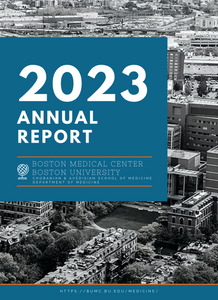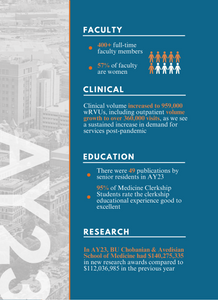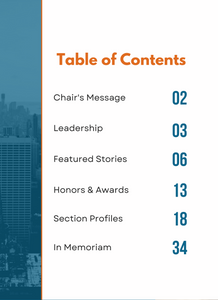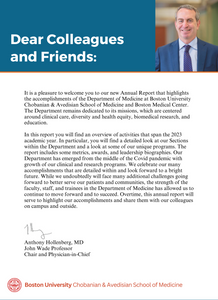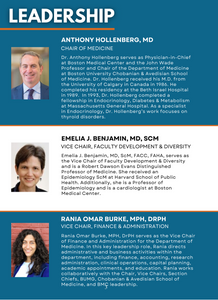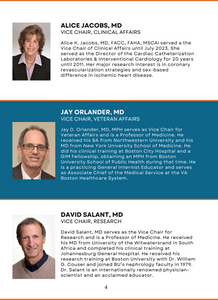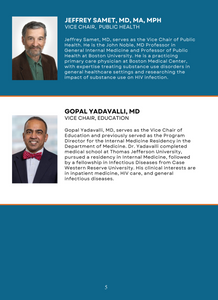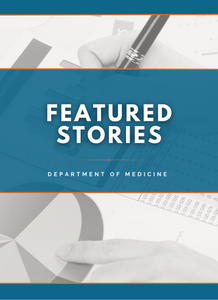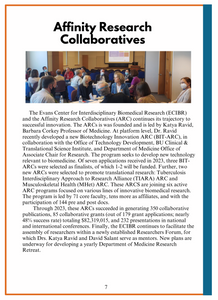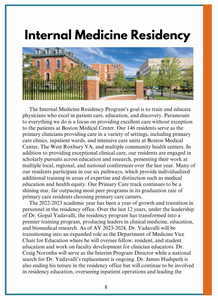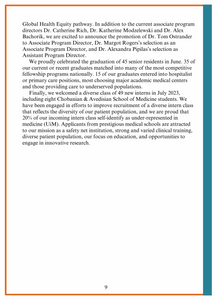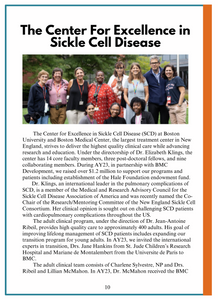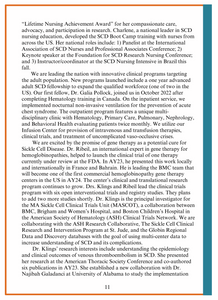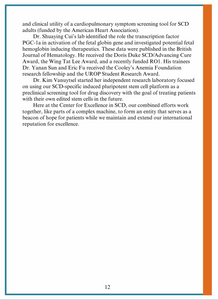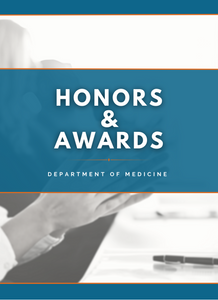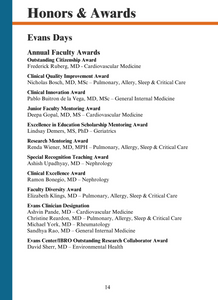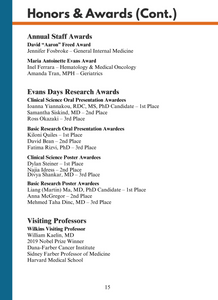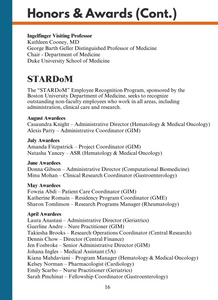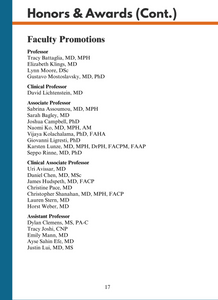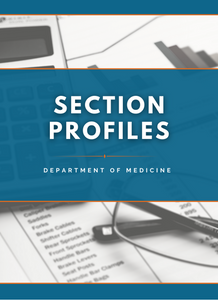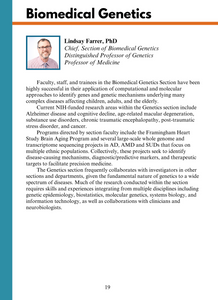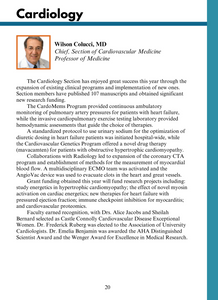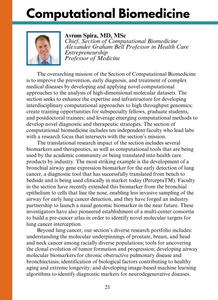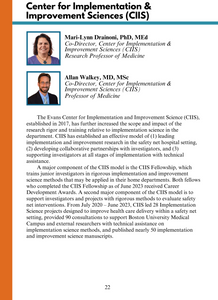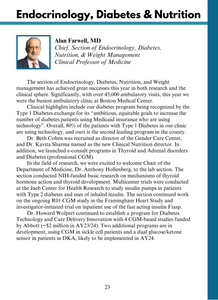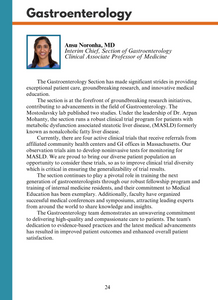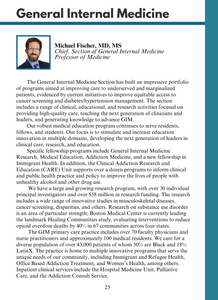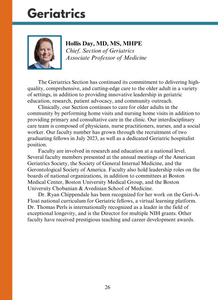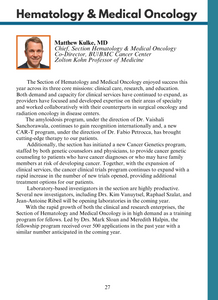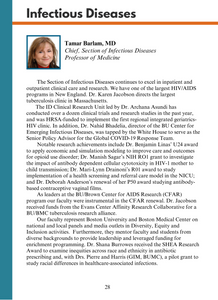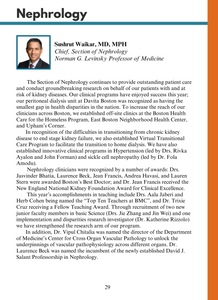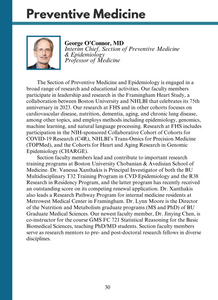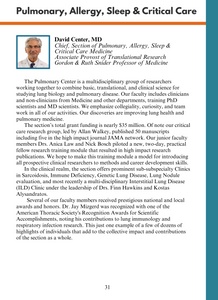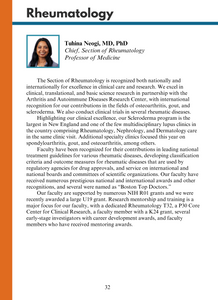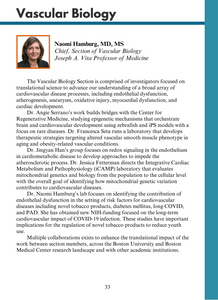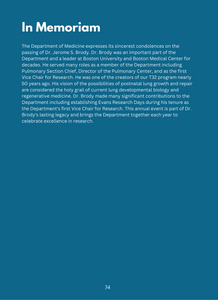37th Annual Evans Days Symposium Highlights Extensive, Important Research
Tablet in hand, David Salant, MD, the Robert Dawson Evans Distinguished Professor of Medicine, paused briefly in his judging of the 160 poster presentations at the annual Department of Medicine Evans Days, to answer a question on what had changed over the 37-year history of the two-day symposium.
“The volume and quality of the science,” Salant explained succinctly.
Held Oct. 19-20 this year, Evans Days highlights research carried out by trainees and faculty in the Department of Medicine and their collaborators across the Medical and Charles River campuses and are supported by the Evans Endowment. The Endowment was established in 1912 by Marie Antoinette Evans with funding provided to what was then known as the Massachusetts Homeopathic Hospital, now Boston Medical Center (BMC). Intended to foster both research and teaching, the Evans Endowment supports both clinical and translational research and training and academic programs at the school and BMC.
In addition to more than 150 posters and oral presentations, Evans Days hosts and features presentations by two eminent visiting professors, as well as ongoing research undertaken in Affinity Research Collaboratives (ARC). The ARCs are the building blocks of the Evans Center for Interdisciplinary Biomedical Research (ECIBR), founded in 2009 with Evans Endowment support to facilitate interdisciplinary approaches across the University. “Each ARC consists of investigators representing different disciplines bound by a common interest and focused on translational research,” said Katya Ravid, DSc, the Barbara E. Corkey Professor of Medicine and ECIBR founding director. To this end, during the 2023 Evans Days, participants heard from Jay Mizgerd, ScD, the Jerome S. Brody Professor of Medicine; Matthew Kulke, MD, the Zoltan Kohn Professor of Medicine; and Vijaya B. Kolachalama, PhD, associate professor of medicine, who presented reports focused on new discovery in their respective ARCs.
Newly featured this year was the David L. Coleman, MD, Junior Faculty Prize for outstanding research, citizenship and mentorship by an assistant professor. Assistant Professor of Medicine Anica Law, MD, MS, was named the inaugural recipient. Her presentation, attended by former Chair of Medicine Coleman, followed the ARC presentations and focused on the outcomes of critically ill patients who require long-term life support.
The 2023 Evans Days visiting professors, Barbara Kahn, MD, George R. Minot Professor of Medicine at Harvard Medical School, and Gbenga Ogedegbe, MD, MPH, the Dr. Adolph & Margaret Berger Professor of Population Health at New York University Grossman School of Medicine, addressed students, faculty and staff as the Wilkins Visiting Professor and the Ingelfinger Visiting Professor, respectively.
“I’m really impressed with the research you have going on here,” said Kahn in remarks prefacing her lecture in Keefer Auditorium Thursday, Oct. 19. “The posters were great; the short presentations were terrific; the collaboration, the energy, the enthusiasm, the cutting-edge nature of things — congratulations! It’s really been exciting to see.”
Kahn is regarded as one of the leaders in the field of glucose transport and is internationally known for her work on obesity and type 2 diabetes, uncovering the molecular mechanisms underlying fat storage cells, insulin and inter-tissue communication. She said she hoped to leverage the findings outlined in her lecture on signaling lipids that have an anti-inflammatory and anti-diabetic effects to protect against or prevent type 1 and type 2 diabetes.
Before her lecture, Kahn sat down with Anthony Hollenberg, MD, the John Wade Professor and chair of medicine, for an informal question-and-answer session exploring her career. Asked what gives her the greatest joy in her work, Kahn, who has trained more than 100 principal investigators and whom Hollenberg called “a builder of scientists,” said her greatest joy was in training the next generation of scientists, especially physician-scientists.
“It’s a major concern, I think, that physician-scientists are a dying breed,” Kahn said. “It gives me great gratification to take someone who has limited experience and help them not just with research skills but how do you choose a good question, how do you choose something that is going to be worth working on.” She also highlighted the immense importance of collaborative, interdisciplinary science.
Ingelfinger Visiting Professor Ogedegbe is a renowned expert on health disparities, with research focused on evidence-based interventions to reduce cardiovascular risk in minority populations. During his lecture on Friday, Oct. 20, in Keefer Auditorium, he shared how to use research to address health inequities in hypertension.
“Researchers and policy makers don’t talk to each other,” he said. “We focus on our grants. We focus on our papers. We focus on advancing our careers. The policy makers do what they do best – create policy that lacks evidence. Until we bridge that, we won’t be able to narrow the gap that we are seeing today.”
Ogedegbe proposed that programs to achieve health equity need to mitigate the adverse effects of social determinants of health like economic stability, access to quality education and health care, the communities where they live and work, and family and community interactions. He said researchers need to partner with Black communities to support strategies that support adoption of lifestyle changes. Providers need to work with payors to create community clinics, and researchers need to produce policy and data to drive action by stakeholders and policy makers.
It is also worth noting that the 2022 Wilkins Visiting Professor was the 2023 Nobel Prize winner Drew Weissman, MD, PhD (CAMED’87, GRS’87, Hon.’23).
For a list of the 2023 awards and poster winners click here. See more on Facebook.
Congratulations to This Year’s Evans Days Awardees!
Evans Days Poster & Presentation Winners
Clinical Poster Winners:
1st Place: Samantha Malatesta, PhD Candidate
2nd Place: Adriana Flores, MD
3rd Place: Alex Werekuu, MPH
Basic Science Poster Winners:
1st Place: Gwen Beacham, PhD
2nd Place: Burcu Erdogan, PhD
3rd Place: Lorraine Soares De Oliveira, PhD
Clinical Oral Presentation Winners:
1st Place: Lauren Kearney, MD
2nd Place: Victoria Overbeck, MPH
3rd Place: Breanne Biondi, MPH
Basic Oral Science Presentation Winners:
1st Place: Lucien Garo, PhD Candidate
2nd Place: Olivia Perry
3rd Place: Roxana Pfefferkorn, PhD
Faculty Award Winners
Outstanding Citizenship Award
Sarah Kimball, MD – General Internal Medicine
Clinical Quality Improvement Award
David Yuh, MD – General Internal Medicine
Clinical Innovation Award
Deepa Gopal, MD, MS – Cardiovascular Medicine
Nir Ayalon, MD – Cardiovascular Medicine
Junior Faculty Mentoring Award
Jessica Taylor, MD – General Internal Medicine
Research Mentoring Award
Alexander Walley, MD – General Internal Medicine
Special Recognition Teaching Award
Mark Sloan, MD – Hematology & Oncology
Clinical Excellence Award
Praveen Govender, MB BCh – Pulmonary, Allergy, Sleep & Critical Care Medicine
Faculty Diversity Award
Kaku So-Armah, PhD – General Internal Medicine
Evans Clinician
Lauren Stern, MD – General Internal Medicine
David Coleman, MD Junior Faculty Prize
Anica Law, MD, MS – Pulmonary, Allergy, Sleepy & Critical Care Medicine
Staff Awards Winners
Maria Antoinette Evans Award
Erin Kane – Computational Biomedicine
Daneiris Heredia-Perez, MSPM – General Internal Medicine
David “Aaron” Freed Award
Dennis Chow – Central Finance
Evans Center/IBRO
Evans Center/IBRO Outstanding Research Collaborator Award
Elise Morgan, PhD – Engineering Design & Innovation
CReM Celebrates 10th Anniversary as Pioneering Center for Stem Cell Research
Professor of Medicine Gustavo Mostoslavsky, MD, PhD, recalled fellow Argentinian scientist and Nobel Prize winner Cesar Milstein telling him that as young scientist you are presented with a ball full of knots and that you keep untying them, one knot at a time, and, maybe, 20 years later you might have a major discovery.
In the decade since the Center for Regenerative Medicine (CReM) of Boston University and Boston Medical Center (BMC) was established by co-founders Mostoslavsky, Professor of Medicine Darrell Kotton, MD, and Associate Professor of Medicine George Murphy, PhD, there has been a lot of untying of knots on some of the world’s most intractable diseases.
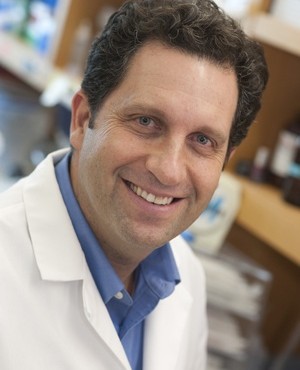
“We have a slogan that reflects our mission – ‘Advancing Science to Heal the World,’” said Kotton. “And we’ve tried to pursue that in the most selfless way possible.”
Regenerative medicine uses stem cells and the body’s natural healing process to replace or rebuild damaged tissues and organs. Until Japanese scientist Shinya Yamanaka, MD, PhD, discovered a way to make induced pluripotent stem cells (iPSCs) from mouse fibroblasts in 2006 and then from human fibroblasts in 2007, research had been restricted by political and ethical debates over using pluripotent stem cells from human embryos. iPSCs are cells engineered from adults that are nearly identical to embryonic stem cells (ESCs). Once engineered in the laboratory in the undifferentiated state, like ESCs, iPSCs are pluripotent – meaning they have many potentials. Once differentiated iPSCs can be used to build specific tissues and organs, mimicking the embryonic tissue-building process.
“The stem cell field really took off with the discovery of reprogramming, of how to generate these pluripotent stem cells from anyone, especially patients,” said Kotton.
CReM first launched in 2008 as a virtual center with a seminar series and a website. Within a few years, Kotton, Mostoslavsky and Murphy were able to gain the support of Kate Walsh, then President and CEO of Boston Medical Center (BMC), former BU President Robert Brown, medical school Dean Karen Antman, MD, and David Coleman, MD, then chief and chair of the department of medicine, now professor emeritus of medicine. The virtual center was also supported by Katya Ravid, PhD, when the group received the inaugural Affinity Research Collaborative (ARC) award given out by Ravid’s then new Evans Center for Interdisciplinary Biomedical Research.
The CReM became a physical center when it opened its doors in 2013 with support from BU and BMC and its lab space has since grown from around 7,000 to 16,000 square feet, from one culture room to five, and from 25 researchers in six labs to 66 working in nine labs. The group’s high impact publications have resulted in yearly accolades from a variety of campus and national organizations and an impressive 300% growth in grant dollars.
Kotton separates the center’s progress over the past decade into three phases. In the early years, CReM made significant progress in reprogramming cells from patients, making iPSCs that duplicate cells or tissues needed for damage repair. In the middle years, there were remarkable advances in using those stem cells to discover how tissues are encoded and differentiate to become specific organs and other parts of the body. More recently, CReM research advanced the science of engraftment, the transplanting of these engineered cells and organoids into damaged organs in animal models, successfully regenerating a variety of injured tissues.
“The transplanted cells rescue organ function, and they survive in some cases, for the lifetime of the recipient,” said Kotton.
The next phase is to move testing into larger animals and then into human clinical trials, with the goal of creating gene therapies using stem cells.
“I think anybody around the world would recognize that the CReM has made contributions in those three areas: reprogramming technology to make stem cells; directed differentiation to make really advanced organoids and cell types; and our progress towards cell and gene-based therapies,” said Kotton.
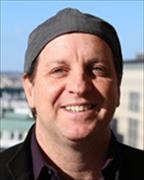 One of the CReM’s first discoveries as a still virtual center was publication of a new reprogramming approach, led by Mostoslavsky, ultimately earning him the award for “BU Innovator of the Year” in 2017. iPSC generation was a time-consuming and expensive process until Mostoslavsky developed a tool called STEMCCA that made it simpler and more efficient. BU patented the tool, and it was freely shared and used in over 1,000 labs worldwide.
One of the CReM’s first discoveries as a still virtual center was publication of a new reprogramming approach, led by Mostoslavsky, ultimately earning him the award for “BU Innovator of the Year” in 2017. iPSC generation was a time-consuming and expensive process until Mostoslavsky developed a tool called STEMCCA that made it simpler and more efficient. BU patented the tool, and it was freely shared and used in over 1,000 labs worldwide.
“In the last 10 years, we have become much, much better at making cells that are closer to what they are supposed to look like,” said Mostoslavsky. He’s hoping that the future brings advancements in cell and tissue manufacturing that will enable them to build whole, functioning organs.
But as current researchers, students and alumni of the program gather at Mostoslavsky’s home this weekend to mark CReM’s 10th anniversary, it is not just the untying of scientific knots they will be celebrating.
“Many famous centers have big discoveries, but I think, in addition to the scientific discoveries, what is unique about the CReM is the track record of selfless sharing,” said Kotton, who was named the inaugural recipient of the AAMC’s National Research Resource Sharing Award (2017) in recognition of the CReM’s record of sharing their stem cells.
Kotton, Mostoslavsky and Murphy came to BU because of its culture of collaborative research. They decided from the outset that the center would follow the open-source sharing model that had emerged in the computer code-writing culture. They created biobanks that housed stem cells and organoids and made them freely available upon request. They are one of the largest repositories of iPSC samples for various diseases in the world.
“It’s 100% that people know us and recognize us as the guys that collaborate and share,” said Mostoslavsky. This sharing and collaborative principle was something that the world came to realize as an important principle in the desperate race to develop tests and find vaccines to fight the COVID-19 pandemic.
“There was a lot of cultural dogma at the time (CReM was founded) that you have to protect your research until you publish because you are in competition with others and are going to get scooped,” said Kotton. “The collaborative approach is more efficient and faster, with shared research across the globe. For us it’s been an even more positive and productive experience than we planned at the beginning.”
Today, the CReM includes nine principal investigators covering different aspects of developmental biology, stem cell biology and regenerative medicine. Associate Professor of Medicine Andrew Wilson, MD, who was recently named scientific director of the Alpha-1 Foundation, runs both a research program in the CReM and an internationally recognized clinical center at BMC focused on caring for patients affected by alpha-1 antitrypsin deficiency, the most common genetic cause of chronic obstructive pulmonary disease. Assistant Professor of Medicine Finn Hawkins, MBBCh, uses iPSCs to develop new therapies for genetic airway diseases, such as cystic fibrosis.
CReM co-founder Murphy, who originally established studies in the field of sickle cell anemia, is now part of a team studying supercentenarians and understanding aging and extreme longevity. Valerie Gouon-Evans, PhD, MS, PharmD, directs the BU Liver Biology Program, focused on developing approaches for liver regeneration. Angie Serrano, PhD, assistant professor of medicine, joined CReM in 2022, studying iPSCs and how various mutations impact cell fates in a variety of diseases.
The two newest additions, Kim Vanuytsel, PhD, MS, and Kostas Alysandratos, MD, PhD, research treatments for sickle cell disease and interstitial lung diseases, respectively. Together with Mostoslavsky, who works on understanding neurodegeneration, intestinal organoids and T cells, and Kotton who studies lung injury and repair, these faculty lead the nine research programs of this multi-disciplinary center, advancing the field of stem cell biology and regenerative medicine.
Call for DEIA Week Volunteers – Apply Here!
The Department of Medicine will hold its first annual Diversity, Equity, Inclusion and Accessibility Week the week of March 18, 2024. We are looking for members of our faculty, staff, and trainees to take part in the planning and implementation of this event.
In the DoM, we are dedicated to fostering a workplace that values and celebrates diversity, promotes equity, ensures inclusion, and prioritizes accessibility. We firmly believe that our collective differences make us stronger, and we are committed to creating an environment where all individuals, regardless of their background, feel valued, respected, and empowered.
The charge of this committee is to help us determine the best way to celebrate and educate our community about the wide range of characteristics and attributes that make individuals unique, including but not limited to: race, ethnicity, sex, gender, gender identity & expression, sexual orientation, age, religion, disability, neurodiversity, socioeconomic status, nationality, immigration status, language, cultural background, education, work experience, etc.
The committee will be meeting regularly from November – March.
Access the Application HERE – Deadline for application is 10/23
For questions, please contact Jen (Visconti) Murphy, Jennifer.visconti@bmc.org
Dr. Frederick Ruberg Named Next Section Chief of Cardiovascular Medicine
The Department of Medicine is very pleased to announce that Dr. Frederick L. Ruberg will become the next Section Chief of Cardiovascular Medicine, effective December 1, 2023. Dr. Ruberg will also be appointed as the Thomas J. Ryan Professor of Medicine. As you all know, he has served Boston Medical Center and Boston University Chobanian & Avedisian School of Medicine for many years, having been initially appointed as a faculty member in 2005.
Dr. Ruberg attended the University of Pennsylvania Perelman School of Medicine. He then completed internal medicine training at Brigham and Women’s Hospital, a cardiovascular disease fellowship at Boston Medical Center/Boston University Chobanian & Avedisian School of Medicine, and a fellowship in cardiovascular magnetic resonance imaging at Beth Israel Deaconess Medical Center. He has served as Associate Chief of Cardiovascular Medicine at BU/BMC since 2017. Dr. Ruberg has an active clinical practice as the senior cardiologist in the renowned BU/BMC Amyloidosis Center. An internationally-recognized expert in amyloid heart disease, he has co-directed or contributed to numerous collaborative clinical guidelines initiatives on cardiac amyloidosis, including the 2021 American Heart Association scientific statement and the 2023 American College of Cardiology Expert Consensus Decision Pathway document. In addition to his appointment as Professor of Medicine, he holds a secondary appointment as Professor of Radiology and directs the cardiac MRI program at BMC. A recognized scientific mentor who is committed to the development of clinician scientists, he serves as Workforce Development Program lead of the Boston University Clinical and Translational Science Institute and has been recognized with mentorship (2017) and citizenship (2022) awards from the Department of Medicine. Dr. Ruberg is Senior Associate Editor of Circulation: Cardiovascular Imaging, a Fellow of both the American Heart Association and American College of Cardiology, and a member of the Association of University Cardiologists.
Dr. Ruberg is presently the co-principal investigator of the NIH-funded Screening for Cardiac Amyloidosis with Nuclear Imaging in Minority Populations (SCAN-MP) study, one of the largest NIH-funded studies exploring heart failure causes and outcomes in older, self-identifying Black and Hispanic patients. Dr. Ruberg is deeply committed to developing an equitable and supportive clinical and research environment at BU/BMC that champions our shared mission and values. To achieve this goal, he serves on multiple BUMG-sponsored committees organized to facilitate gender and racial equity at BU/BMC.
Dr. Ruberg’s appointment comes after an extensive national search. We would like to thank Dr. David Salant and the search committee for their work in this process. The Department would also like to thank Dr. Wilson Colucci for all of his efforts in building and leading the Section to its current position of excellence and prominence. We look forward to celebrating Dr. Colucci’s tenure of 26 years as Section Chief in the near future.
Please join us in congratulating Dr. Ruberg on his new role.
DoM Seeking Applicants for the Evans Junior Faculty Research Merit Award
Since the 2008-9 academic year, the Department of Medicine has made annual awards to recognize and assist outstanding junior faculty investigators through the Evans Junior Faculty Research Merit Award.
We are pleased to announce that we are now seeking applications for AY 24-25.
The award provides two years of support at up to $50,000 per year for a total amount of $100,000. The funds can be used for research-related activities such as salary, equipment, and supplies.
The selection criteria for the Evans Junior Faculty Merit Award are as follows:
- Outstanding record of scholarship and research;
- Rank of Assistant Professor or Research Assistant Professor;
- Likelihood of superior productivity and accomplishment in the future;
- Receipt of at least one successful peer-reviewed grant since joining the faculty.
Individuals who have not previously received a start-up package (i.e., funds for research supplies, equipment, or personnel) will be given preference by the review committee. We anticipate that 2-4 recipients of the award will be selected by a committee comprised of senior faculty, the Vice Chair for Research, and the Department Chair.
Eligible faculty in the Department of Medicine should provide the following materials to Ms. Vanessa Nguyen vanessa.nguyen@bmc.org by Monday, October 30, 2023:
- A one-page summary of past research accomplishments and future research goals;
- A description of institutional resources provided to the faculty member since joining the faculty;
- An updated C.V. that includes past, current, and pending grant support, honors, mentoring activities, and a brief description of any clinical or educational responsibilities.
Embracing Culture to Inform Care – Meet DoM Endocrinologist & Director of Obesity Medicine at BMC
Meet Dr. Ivania Rizo, endocrinologist and the director of obesity medicine at BMC. She shares a bit about herself, what Hispanic Heritage Month means to her, and what she enjoys about her work.
💭 How does your upbringing impact your care?
🗣 I was born in Wisconsin to Nicaraguan parents who were studying in the U.S. We moved to Nicaragua when I was three months old, and then back to the U.S. in the middle of the Nicaraguan Revolution when it was no longer feasible to live there and prosper.
Everyone has their own story, but I think mine helps me understand people who live with economic instability and have had to adjust to multiple cultures and languages. There’s a connection between all immigrants — not just Latinos — who’ve had to pick up and restart our lives somewhere else.
💭 What does this month mean to you?
🗣 For me, Hispanic Heritage Month is a time to celebrate our diversity and appreciate all of our different foods, music, and art. As a bilingual provider, I spend half my day speaking Spanish to patients from the Dominican Republic, Colombia, El Salvador, Guatemala, Honduras, Puerto Rico, Mexico, and even Nicaragua. It’s fun to speak with them, learn their stories, and share our cultures. At BMC, we always provide interpreters, but when your provider can speak your language, it creates a certain amount of trust and allows patients to feel more comfortable expressing all their concerns and questions.
💭 What is your favorite part about working at BMC?
🗣 It’s great to work in a state like Massachusetts where we are able to provide the best evidence-based medicine to all people. And on top of that, BMC is an institution that works to make sure we are actually implementing that kind of care.
I’ve been at BMC for 16 years, and one thing that keeps me excited about working here is the emphasis on improving the health of Black and Latino patients. I’m excited to be the co-lead of the diabetes inequity initiative of BMC’s Health Equity Accelerator, working to improve outcomes in diabetes for our Black and Latino patients.
DoM Faculty Members Awarded Bridge Funding Through the BMC CSO Office
We are delighted to announce that four DoM faculty researchers have been awarded bridge funding through the BMC CSO Office. We would like to both share their accomplishments with our community and also thank BMC leadership for their commitment to and investment in our research faculty.
Dr. Sarah Bagley, Departments of Medicine and Pediatrics, General Internal Medicine and Pediatric Health Services Research: Dr. Bagley’s research focuses on developing strategies to engage youth who use drugs to minimize overdose risk, reduce complications of drug use, and optimize their health.
Dr. Deepa Gopal, Department of Medicine, Cardiology: Dr. Gopal’s research focuses on identifying and potentially preventing heart failure with preserved ejection fraction.
Dr. Elliott Hagedorn, Department of Medicine, Section of Hematology & Medical Oncology and Associate Member, Center for Regenerative Medicine: Dr. Hagedorn’s research focuses on understanding the molecular mechanisms by which blood and immune cells migrate in and out of specific tissues, with the goal of translating the basic research into clinical therapies for treating human diseases.
Dr. Gene Kwan, Department of Medicine, Cardiology: Dr. Kwan’s research focuses on enhancing equitable care delivery and use of health services for cardiovascular diseases in rural low-income countries.
AY23 DoM Annual Report
James Hudspeth, MD FACP Selected to Serve as the Next Vice Chair of Clinical Affairs
We are pleased to announce James Hudspeth, MD FACP as the next Vice Chair of Clinical Affairs for the Department of Medicine. Dr. Hudspeth will begin in this role in November 2023.
In his roles as Medical Director of the General Medicine Inpatient Teams and subsequently Associate Director of the Hospital Medicine Unit, Dr. Hudspeth has led a range of initiatives to improve patient care and the educational experience in the inpatient context. Notable efforts include work around regionalizing inpatient care teams to improve patient care, the development of graded autonomy teams for late-year interns in internal medicine, supporting the rollout of an ED boarder program at BMC, and multiple efforts to change the inpatient team structure to better support education including serving as an Associate Program Director of our training program. Critically he led many of our efforts in the organization of our ward teams during the acute phases of the COVID-19 pandemic. Recently, Dr. Hudspeth was selected to lead the Ravin Davidoff Executive Fellowship in Health Equity at BMC.
Dr. Hudspeth is a model faculty member and clinician. He was an inaugural recipient of the ‘Excellence in Care Award’ from the Boston University Medical Group in 2017, and subsequently the inaugural recipient of the ‘Provider of the Year Award for Hospital Wards’ from the BMC Department of Nursing. He received a ‘Gold Society Humanism in Care Award’ in 2021 from BUSM and was promoted to Clinical Associate Professor of Medicine in 2023.
As Vice Chair of Clinical Affairs Dr. Hudspeth will lead our efforts to grow and enhance the capabilities of all Departmental clinical programs ensuring the best use of space and resources to meet the growing needs of patients at Boston Medical Center and in the communities we serve.
